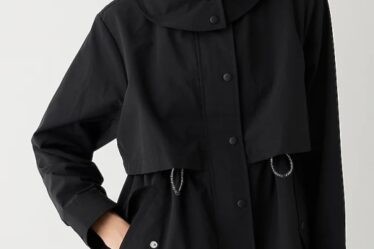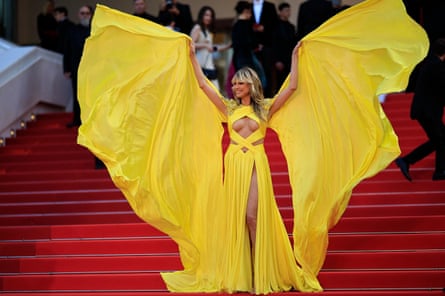
At night, the Croisette in Cannes is lit up by 1,500 dark pink LED lights. It happens all year. But during the film festival, which ends this weekend, these lights transform the boulevard into a red carpet. It’s where industry types with lanyards queue for parties, fashion types jostle to be seen, and fans on the blue chairs sit and watch – and it explains why the festival is fast becoming an unofficial fashion week.
Cannes film festival is no stranger to high fashion. Entrance-making gowns and jewels are almost mandatory, particularly after the luxury jeweller Chopard redesigned the festival’s highest prize, the Palme d’Or, in 1998.
But this year, it has prompted new levels of fashion hysteria – miles from the writers’ strike that has halted much of the film industry. Chopard and Donatella Versace have hosted fashion shows, Naomi Campbell had a model-heavy birthday party at Villa Julia on the seafront, and the former Vanity Fair editor Graydon Carter and the fashion house Celine held starry soirees at the exclusive Hotel du Cap-Eden-Roc. Even the films have high fashion baked in – the newly formed Saint Laurent Productions collaborated with Pedro Almodóvar on costumes for a short film A Strange Way of Life.
Speaking before her show, Versace said: “[Cannes] it’s not just about film. It’s about culture – the actresses, the 60s, the glamour … It makes sense the two things should sit together.”
“From a red carpet perspective, this feels like the first proper comeback post pandemic,” said Emma Spedding, Vogue’s acting executive fashion news and features editor, who describes the red carpet as “bolder than I ever remember seeing during an awards season”.
At a film festival, you don’t need the “mass appeal of a classic ballgown or pretty princess dress”, said Spedding. Cannes likes to focus on old-world glamour or “anti-viral fashion”.
The focus is on the film first, which has shifted the goalposts of what traditional red-carpet wear can be. With multiple events come multiple costume changes. Natalie Portman, who wore a “reimagined” Dior dress from 1949, told Vogue: “[Cannes fashion] seems to exist in this other era, where you can go really wild and extreme.”
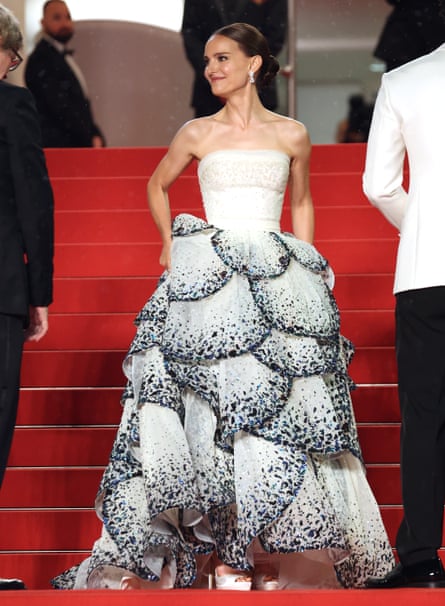
It’s also about the weather. Mixed skies aside, it’s the first big summer festival and the red carpet outside the Palais des Festivals is wide and short, so there’s more loitering. “People also make the most of the steps, wearing oversized gowns that [photograph well from behind] and tend to be more theatrical,” said Spedding.
The festival is not without controversy. Isabelle Huppert, who appeared in the Balenciaga ad campaign in which children were photographed holding teddy bears in bondage gear, wore two looks by the French brand. She is one of the biggest stars to wear something from its most recent collection post-scandal (by contrast not one celebrity wore the brand to the Oscars).
Meanwhile, few batted an eyelid at Chanel’s decision to design costumes for Johnny Depp’s comeback film, Jeanne du Barry, which opened the festival.
One fashion insider, who works for one of the most prominent labels on the Cannes red carpet, said: “I’ve noticed that the main US awards are more heavily financially backed – with fees of $100k+ for a red carpet look – so there is so much more pressure. Brands want to ensure there is a return on investment, with a focus on eye-catching looks rather than nice ones.”
While red carpets tend towards stylist-led predictability and, at best, calculated risk-taking – think Kim Kardashian in Marilyn Monroe’s dress at the Met Gala – “at Cannes, there is less obligation [to wear certain brands and certain things]”.
“As everyone stays at the hotel across the road from the main red carpet, and every bar is full of people actually working, there’s a reason to be there other than just to be seen wearing the right thing,” she said.
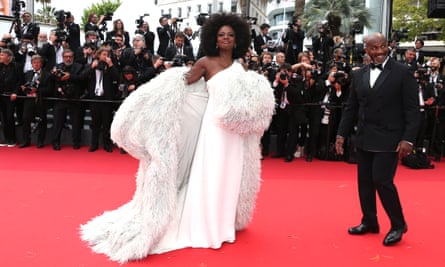
Naturally this closed-door glamour tends to attract people from outside its inner circle. Clarissa Rosato is a Brazilian designer who has come to Cannes “with a dress, an actress and a dream”. Walking up the Croisette on Tuesday night wearing one of her own designs, she described Cannes as a festival “led by haute culture”, not fashion.
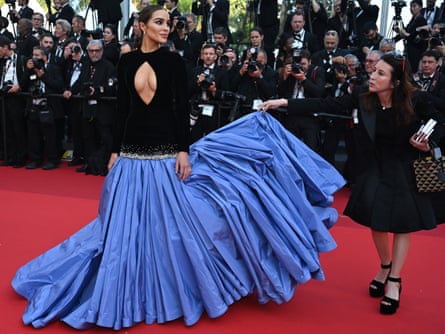
“At the US festivals, they wear beige and black – but there are more risk-takers here and you can get your clothes seen by more people,” she said. “This is why a lot of designers turn up.”
Rosato’s dress, a diaphanous blue gown based on her artist mother’s artwork, was worn by the actor Priscila Vaz – and has been a hit. “We were getting stopped on the red carpet for 45 minutes,” Rosato said. “It was crazy!”
Zarife Zgheib, a fashion expert for the Middle Eastern magazine Hia, thinks it’s important to separate the red carpet from the Croisette street style. Beyond the red carpet “there are a lot of people dressed up and behaving like celebrities, who just want to be a part of it. People really kill to be here.”


